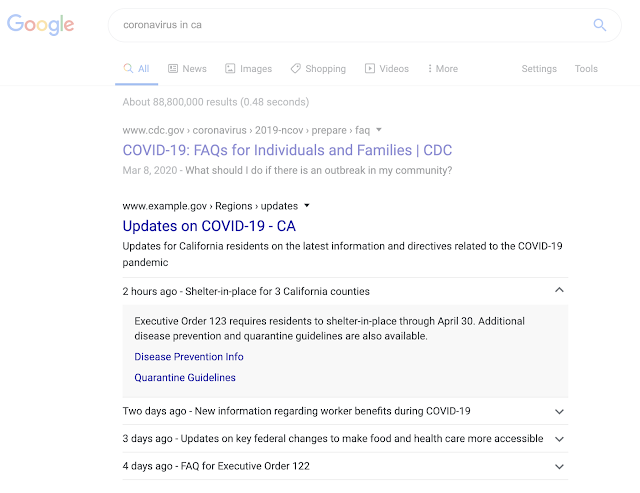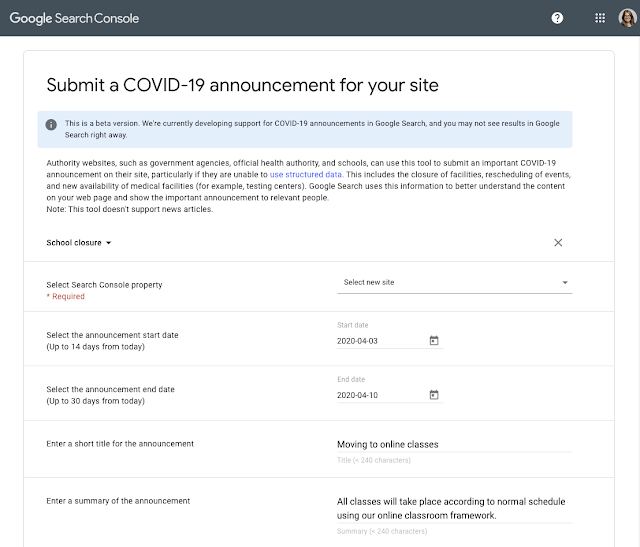Introducing a new way for sites to highlight COVID-19 announcements on Google Search
Due to the COVID-19 outbreak, many organizations and groups are publishing important coronavirus-related announcements that affect our everyday lives.
In response, we’re introducing a new way for these special announcements to be highlighted on Google Search. Sites can add SpecialAnnouncement structured data to their web pages or submit a COVID-19 announcement in Search Console.
At first, we’re using this information to highlight announcements in Google Search from health and government agency sites, to cover important updates like school closures or stay-at-home directives.
We are actively developing this feature, and we hope to expand it to include more sites. While we might not immediately show announcements from other types of sites, seeing the markup will help us better understand how to expand this feature.
Please note: beyond special announcements, there are a range of other options that sites can use to highlight information such as canceled events or changes to business hours. You can learn more about these at the end of this post.
How COVID-19 announcements appear in Search
When SpecialAnnouncement structured data is added to a page, that content can be eligible to appear with a COVID-19 announcement rich result, in addition to the page’s regular snippet description. A COVID-19 announcement rich result can contain a short summary that can be expanded to view more more. Please note that the format may change over time, and you may not see results in Google Search right away.
How to implement your COVID-19 announcements
There are two ways that you can implement your COVID-19 announcements.
RECOMMENDED: Add structured data to your web page
Structured data is a standardized format for providing information about a page and classifying the page content. We recommend using this method because it is the easiest way for us to take in this information, it enables reporting through Search Console in the future, and enables you to make updates. Learn how to add structured data to COVID-19 announcements.
ALTERNATIVE: Submit announcements in Search Console
If you don’t have the technical ability or support to implement structured data, you can submit a COVID-19 announcement in Search Console. This tool is still in beta testing, and you may see changes.
This method is not preferred and is intended only as a short-term solution. With structured data, your announcement highlights can automatically update when your pages change. With the tool, you’ll have to manually update announcements. Also, announcements made this way cannot be monitored through special reporting that will be made available through Search Console in the future.
If you do need to submit this way, you’ll need to first be verified in Search Console. Then you can submit a COVID-19 announcement:
More COVID-19 resources for sites from Google Search
Beyond special announcements markup, there are other ways you can highlight other types of activities that may be impacted because of COVID-19:
- Best practices for health and government sites: If you are a representative of a health or government website, and you have important information about coronavirus for the general public, here are some recommendations for how to make this information more visible on Google Search.
- Surface your common FAQs: If your site has common FAQs, adding FAQ markup can help Google Search surface your answers.
- Pausing your business online: See our blog post on how to pause your business online in a way that minimizes impacts with Google Search.
- Business hours & temporary closures: Review the guidance from Google My Business on how to change your business hours or indicate temporary closures or how to create COVID-19 posts.
- Events: If you hold events, look over the new properties for marking them virtual, postponed, or canceled.
- Knowledge Panels: Understand how to recommend changes to your Google knowledge panel (or how to claim it, if you haven’t already).
- Fix an overloaded server: Learn how to determine a server’s bottleneck, quickly fix the bottleneck, improve server performance, and prevent regressions.
If you have any questions or comments, please let us know on Twitter.
Posted by Lizzi Harvey, Technical Writer, Search Relations, and Danny Sullivan, Public Liaison for Search


